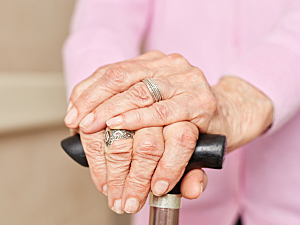Frailty—a reduction in physiologic reserve that results in decreased ability to tolerate stressors—is increasingly proving superior to chronologic age for identifying older adults at risk of various adverse health outcomes.
Ariela Orkaby MD, MPH, a geriatrician–epidemiologist in the Division of Aging at Brigham and Women’s Hospital, Shoshana Streiter, MD, geriatrician in the division, Frances Hu, MD, MSc, general surgery resident at the Brigham, Rachelle Bernacki, MD, MS, director of quality initiatives in the Division of Adult Palliative Care at the Dana-Farber Cancer Institute, and colleagues recently added to this evidence. In the Journal of General Internal Medicine, they say increased frailty status as rated on the Clinical Frailty Scale (CFS) is associated with increased mortality in older adults after in-hospital cardiopulmonary resuscitation (CPR).
Methods
The CFS is a nine-point scale designed for rapid use in busy clinical settings including ICUs and emergency departments. The researchers developed an algorithm, presented in the article, for retrospective calculation of CFS scores using electronic medical records.
Inter-rater reliability was >90%, and the method was valid: when applied to charts of 10 patients who had recently been assigned a CFS score in person, seven retrospective scores matched the in-person scores exactly and three were within one point.
The team proceeded to calculate CFS scores for 324 patients ≥65 years old (mean age, 77) who underwent CPR after cardiac arrest between January 1, 2018, and January 31, 2020, at the Mass General Brigham Integrated Health Care System.
Distribution of CFS Scores
57 patients (18%) were found to have a CFS score of 1–3 and were judged not frail. The rest of the cohort was rated as:
- Very mildly frail (score of 4)—26%
- Mildly frail (score of 5)—16%
- Moderately frail (score of 6)—25%
- Severely frail (score of 7–9)—15%
CFS Score and In-hospital Mortality
In-patient mortality after CPR was 73% and 30-day mortality was 74%. In a multivariable analysis controlling for patient age, sex, race and Charlson Comorbidity Index, the adjusted odds of in-hospital mortality compared with a CFS of 1–3 were:
- 1.6 for a CFS of 4
- 3.0 for a CFS of 5
- 4.4 for a CFS of 6
- 4.6 for a CFS of 7–9 (P=0.001)
Caveats for Clinicians
The researchers strongly advise against an algorithmic application of these findings, such as discouraging CPR for patients whose CFS score is above a certain threshold. They do recommend using frailty to frame goals-of-care discussions, as many people base difficult health care decisions on their understanding of prognosis.
The comparatively high rates of survival in this cohort are noteworthy. They should caution clinicians against undertreating older adults with minimal frailty burden, who may be more likely to survive CPR than age alone suggests.
